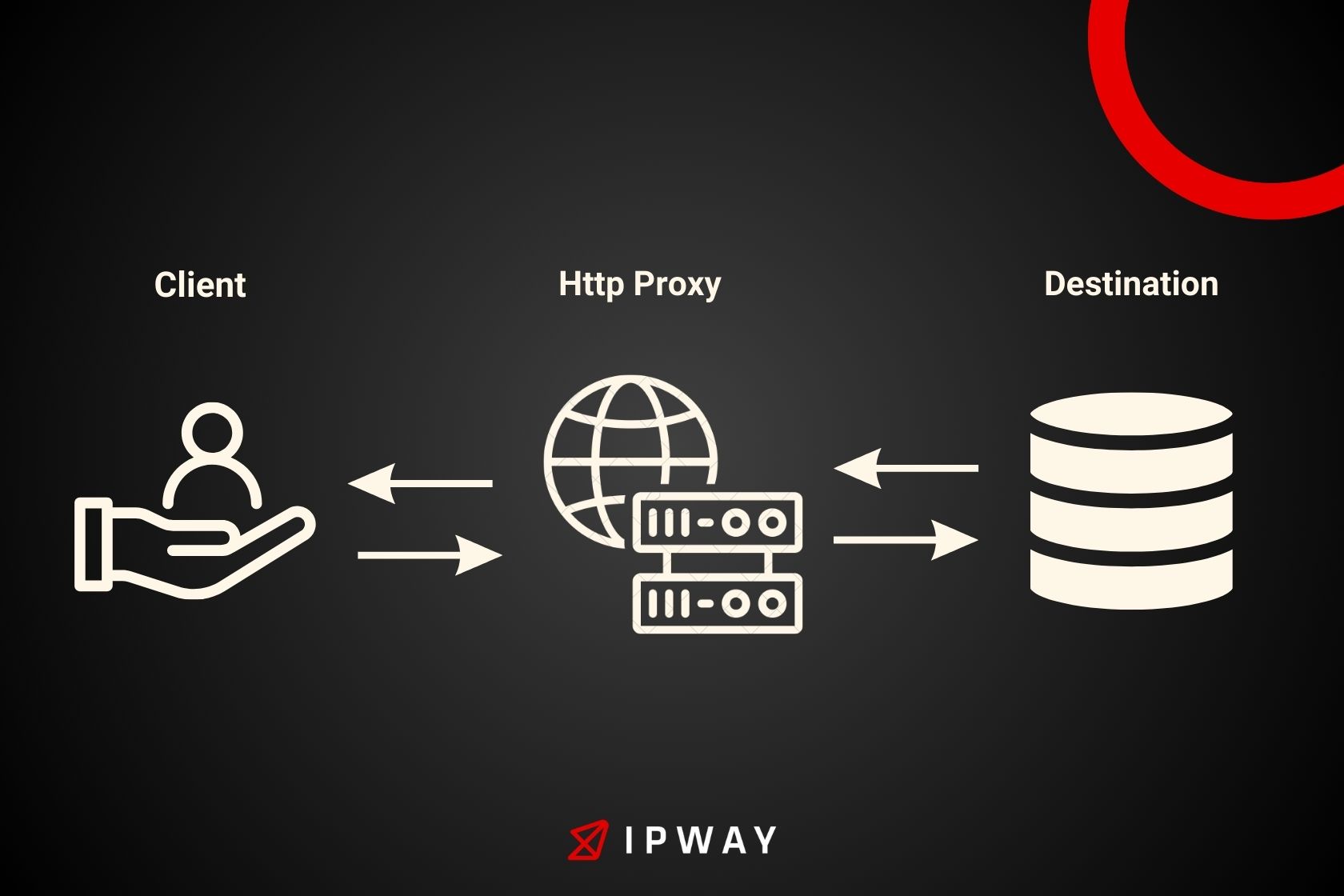Proxies offer a ton of useful solutions that can be used to improve the overall performance of your website or connection. One such proxy type is an HTTP proxy – a tool that allows you to route your web requests through a server, acting as an intermediary between the client and the web server.
HTTP, an abbreviation for HyperText Transfer Protocol, serves as the standard protocol for accessing the internet. You may recognize HTTP as the protocol used for transferring data between a web server and your browser. When you access a website, your browser sends an HTTP request to the server, which then responds with the requested content.

But what if you want your requests to go through an intermediate server before reaching the web server? This is where HTTP proxies can offer a unique advantage. Let’s dive into what
exactly an HTTP proxy is and how it works.
The Big Idea: HTTP proxies are intermediary servers that handle your web requests, allowing you to access content through a different server instead of directly from the web server. Benefits include improved security, anonymity, and optimized performance.
What Is HTTP?
Before looking at proxy servers, let’s take a moment to understand HTTP.
HTTP stands for Hypertext Transfer Protocol and is the foundation of data communication on the World Wide Web. You’ve likely seen it in action whenever you visit a website – the URL of the website starts with “http://” or “https://”.
HTTP is responsible for establishing a connection between the client (your browser) and the server, sending requests for data, and receiving responses. It works on a request-response model, where the client sends a request to the server, and the server responds with the requested data.
HTTP vs HTTPS
You may have encountered two different HTTP variations – HTTP and HTTPS. The primary difference between the two is the added layer of security provided by HTTPS.
- HTTP: HTTP is the standard protocol for transferring data between a web server and a client. It does not provide any encryption, making it vulnerable to attacks such as eavesdropping and man-in-the-middle attacks.
- HTTPS: HTTPS stands for Hypertext Transfer Protocol Secure. It adds an extra layer of security by encrypting the data transferred between the client and the server using SSL or TLS encryption. This ensures that the data is not intercepted or tampered with during transmission.
What Is an HTTP Proxy?
An HTTP proxy acts as a middleman between the client and the web server. It intercepts requests from the client and forwards them to the server on behalf of the client. It also receives responses from the server and sends them back to the client. This allows clients to access websites through the proxy instead of directly communicating with the web server.
Think of an HTTP proxy as a gateway that controls and filters the flow of data between the client and server. It can be used for various reasons, such as improving performance, enforcing security measures, or bypassing restrictions.
What Is An HTTP Proxy Server?
If an HTTP proxy is the gateway, then an HTTP proxy server is the physical or virtual machine that hosts the proxy. It accepts requests from clients and forwards them to the appropriate web servers. There are various types of HTTP proxy servers, each with its own characteristics and uses.
Types of HTTP Proxy Servers
There are various types of HTTP proxy servers available, each serving a different purpose. Some common types include:
Anonymous Proxy
An anonymous proxy server hides the IP address of the client, making it difficult for servers to track the origin of the request. This provides a layer of privacy and allows users to access restricted websites anonymously. Anonymous proxies are great for bypassing content filters or accessing geo-restricted content.
An anonymous proxy may look like a regular web server, making it difficult to detect. However, they are not secure as they do not encrypt the data being transferred between the client and the server.
Pros:
- Provides privacy and anonymity
- Can bypass content filters
Cons:
- Not secure as data is not encrypted
Highly Anonymous Proxy (Elite Proxy)
A highly anonymous proxy, also known as an elite proxy, offers the highest level of anonymity. It hides both the IP address and identity of the client, making it nearly impossible to trace the origin of the request. These proxies are often used for illegal activities or to hide online activities from government surveillance.
Highly anonymous proxies provide better security compared to anonymous proxies, as the data is encrypted. Considering this, elite proxies prove highly effective for accessing diverse geo-restricted content.
Pros:
- Highest level of anonymity
- Provides better security with data encryption
Cons:
- May be slower due to the added encryption process
Transparent Proxy
A transparent proxy server does not hide the IP address of the client. Instead, it passes on the IP address to the server along with the request. Businesses or organizations often use this type of proxy server to manage internet traffic and improve network performance.
Transparent proxies can also be used for caching frequently accessed web pages, reducing bandwidth usage and improving website loading times. However, they do not provide any privacy or security benefits.
Pros:
- Improves network performance
- Caches frequently accessed web pages for faster loading times
Cons:
- Does not provide any privacy or security benefits offered by other types of proxy servers
Which HTTP Proxy is Right For Me?
The type of HTTP proxy server right for you will depend on your specific needs and use case. For instance, a highly anonymous or elite proxy would be the best choice if privacy and security are your top priorities. However, a transparent proxy may be the most suitable option if you want to improve network performance and reduce bandwidth usage.
In some cases, combining different types of proxies can offer the best solution. It is essential to research and understand the features and limitations of each type before deciding which HTTP proxy is right for you.
The Bottom Line
An HTTP proxy server acts as a middleman between the client and server, providing various benefits such as privacy, security, and improved network performance. These are crucial in managing internet traffic and can offer solutions for businesses, organizations, and individuals.
Understanding the different types of HTTP proxies available can help you make an informed decision on which one is right for your specific needs. So the next time you come across terms like “what is a HTTP proxy” or “what is a proxy server,” you will have a better understanding of what they mean and how they can be beneficial.
Explore the options for HTTP proxies and see how they can enhance your internet experience. Don’t let the technical jargon intimidate you; with a little research, you can reap the many benefits of using an HTTP proxy server.
